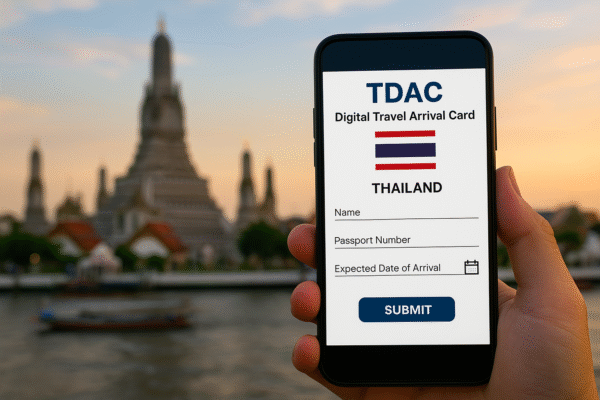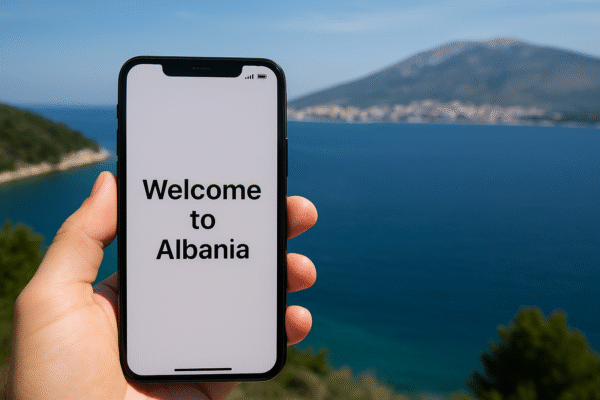Travelers planning their summer getaway to the stunning Greek islands, particularly border destinations like Corfu, are being urged to take precautions against a surprising and costly issue—inadvertent roaming charges. Some tourists have reported unexpected mobile phone bills reaching up to £300, all without leaving Greek soil.
The culprit? Accidental connections to non-EU mobile networks, particularly from nearby Albania. The island of Corfu lies just a few kilometers from the Albanian coast, and in certain areas—especially the northeast—it’s possible for mobile phones to latch onto Albanian networks. Once connected, tourists are charged non-EU roaming fees that are not covered by the EU’s “Roam Like at Home” regulations, which only apply to networks within the European Union.
Why Is This Happening in Greece?
This issue, commonly referred to as “network drift” or inadvertent roaming, occurs when a mobile phone connects to the strongest available signal, even if it’s from a foreign provider. In places like Corfu, the proximity to Albania’s Ksamil region means that mobile networks like Vodafone Albania or One Albania may overpower Greek providers such as Cosmote, Vodafone Greece, or Nova (Wind).
It’s not just Corfu. Other Greek islands near non-EU countries, such as Kos, Chios, Lesvos, and Samos, are also at risk. These eastern Aegean islands sit close to the Turkish coast, and mobile devices may mistakenly connect to Turkish networks, also resulting in high roaming charges.
Similarly, tourists visiting Dubrovnik in Croatia may find their phones connecting to Bosnian networks, while travelers in Germany and Switzerland or France and Monaco could also experience this issue due to their proximity to non-EU areas.
How to Avoid These Unexpected Charges
There are several simple and effective ways to protect yourself from shock charges while traveling in Greece or any border destination in Europe:
1. Manually Select a Greek Network
- Go to your phone’s Settings
- Navigate to Mobile Networks or Connections
- Switch Automatic Network Selection to Manual
- Choose a Greek provider like Cosmote, Vodafone Greece, or Nova
Doing this prevents your device from accidentally switching to a nearby non-EU network.
2. Use an eSIM with EU-Wide Coverage
Another excellent option is to use a Europe-based eSIM. These embedded SIMs allow you to connect to local networks across the EU at local rates without needing to physically swap out SIM cards. Providers like Airalo, Holafly, and Nomad offer eSIM packages tailored for European travel.
According to Airalo, activating an eSIM before departure ensures immediate access to EU-approved data plans and prevents accidental connections to networks outside the EU.
3. Turn Off Data Roaming in Border Areas
In especially risky zones like northeastern Corfu or the east coast of Lesvos, consider turning off mobile data or roaming entirely until you’re certain of your network provider.
4. Monitor Your SMS Alerts
Many travelers reported receiving a text such as “Welcome to Albania” despite being physically in Greece. This is a key indicator that your device has jumped to a foreign network. If you receive such a message, immediately switch networks manually.
Understanding the EU Roaming Policy
Under the EU’s Roam Like at Home regulation, EU citizens can use their mobile phones across the EU at the same rates they pay at home. However, this does not include non-EU countries such as Albania, Bosnia, Turkey, Switzerland, or Monaco. Connecting to a network from one of these countries can result in substantial data, voice, and SMS charges.
A Warning for British Travellers Post-Brexit
Since Brexit, UK mobile providers are no longer obligated to follow the EU’s roaming rules. Although many networks still offer inclusive EU roaming, policies vary widely. O2, EE, Three, and Vodafone UK all have different fair usage caps, and connections to non-EU networks are typically not included.
Travelers are advised to check their network’s current roaming terms before travel and consider purchasing an international or EU roaming bolt-on if available.
Final Tips for a Hassle-Free Greek Holiday
- Update your mobile plan: Check roaming charges before you fly.
- Get a local Greek SIM if you’re staying longer than a few days.
- Enable data usage alerts on your phone to track your consumption.
- Use Wi-Fi where available, especially for heavy data usage like video calls or streaming.
Conclusion
Greece remains one of Europe’s top tourist destinations, offering crystal-clear waters, historic charm, and vibrant culture. But for travelers heading to border islands like Corfu, being aware of potential roaming pitfalls can save hundreds of pounds. With a few precautions and the right mobile setup, you can explore the Greek islands stress-free—and bill-free.
For the latest updates, travelers can also check the official Greek National Tourism Organization (GNTO) website or consult with their mobile service provider.
For more travel news like this, keep reading Global Travel Wire






















